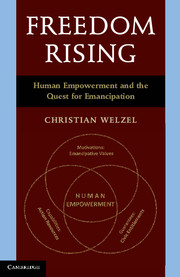Book contents
- Frontmatter
- Dedication
- Contents
- List of Tables
- List of Figures
- List of Boxes
- Abbreviations
- Preface
- Acknowledgment
- Introduction
- Part A Understanding Emancipative Values
- Part B Emancipative Values as a Civic Force
- 5 Intrinsic Qualities
- 6 Benign Individualism*
- 7 Collective Action*
- Part C Democratic Impulses of Emancipative Values
- Part D Emancipative Values in Human Civilization
- Conclusion
- References
- Index
7 - Collective Action*
Published online by Cambridge University Press: 05 June 2014
- Frontmatter
- Dedication
- Contents
- List of Tables
- List of Figures
- List of Boxes
- Abbreviations
- Preface
- Acknowledgment
- Introduction
- Part A Understanding Emancipative Values
- Part B Emancipative Values as a Civic Force
- 5 Intrinsic Qualities
- 6 Benign Individualism*
- 7 Collective Action*
- Part C Democratic Impulses of Emancipative Values
- Part D Emancipative Values in Human Civilization
- Conclusion
- References
- Index
Summary
If you have right on your side, you have no fear.
– Nonviolent female protestor in EgyptThroughout most of history, ordinary people did not play an active role in politics. They lacked the resources as well as the values that one needs to voice claims. Apart from short-lived revolts here and there, politics was entirely an elite game. The idea that institutions would be tailored to the demands of the people and that people would take action to enforce their own claims was implausible for most of the time. The onset of modernity, however, brought a game change. Rising levels of prosperity, literacy, and connectivity among wider population segments reshape mass publics, making their members both capable and willing to voice claims and to take action on their behalf. Where this happens, societies are infused with civic agency.
The first signs of this sea change surfaced with the liberal revolutions of the seventeenth and eighteenth centuries (Markoff 1996; Grayling 2007; Tilly & Wood 2009). Ever since, we see that, in place after place, social movements rise to campaign for the rights of the people (Clark 2009; Carter 2012). In mature democracies, social movements have become a constant source of influence on government, keeping elected officials under permanent pressure (Tarrow 1998; McAdam, Tarrow, & Tilly 2003; Meyer 2004; Kriesi 2009; Keane 2009). In new democracies, social movements have frequently mobilized people against the predemocratic regime, often so powerfully that the pressure was decisive in triggering transitions to democracy (Foweraker & Landman 1997; Karatnicky & Ackerman 2005; Schock 2005; Ulfelder 2005; Welzel 2007a; Teorell 2010). Furthermore, social movement activities around the world turned increasingly less violent over recent decades and became more successful this way in achieving emancipatory goals (Chenoweth & Cunningham 2013). This observation resonates with the key finding of this chapter: rising emancipative values indeed motivate nonviolent social movement activities.
- Type
- Chapter
- Information
- Freedom RisingHuman Empowerment and the Quest for Emancipation, pp. 215 - 246Publisher: Cambridge University PressPrint publication year: 2013



